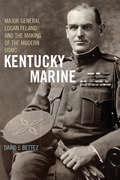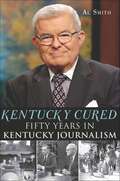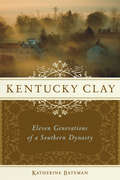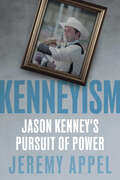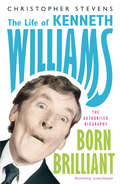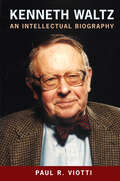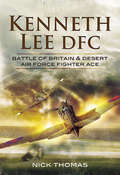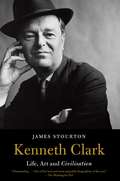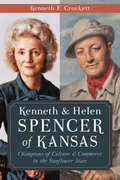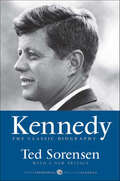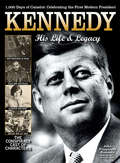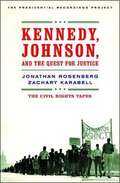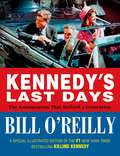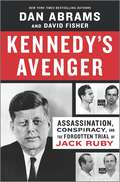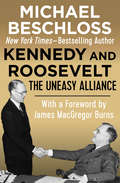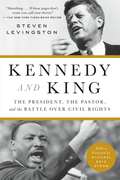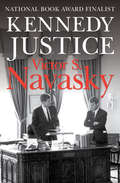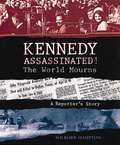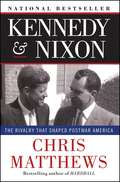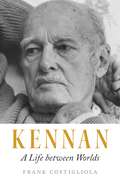- Table View
- List View
Kentucky Marine: Major General Logan Feland and the Making of the Modern USMC
by David J. Bettez“Follows the changes in the Marine Corps from its role as colonial infantry to amphibious assault force . . . us[ing] the career of Maj. Gen. Logan Feland.” —Allan R. Millett, author of Semper FidelisWinner of the Marine Corps Heritage Foundation’s Colonel Joseph Alexander AwardA native of Hopkinsville, Kentucky, Major General Logan Feland (1869-1936) played a major role in the development of the modern Marine Corps. Highly decorated for his heroic actions during the battle of Belleau Wood in World War I, Feland led the hunt for rebel leader Augusto César Sandino during the Nicaraguan revolution from 1927 to 1929—an operation that helped to establish the Marines’ reputation in guerrilla warfare and search-and-capture missions. Yet, despite rising to become one of the USMC’s most highly ranked and regarded officers, Feland has been largely ignored in the historical record.In Kentucky Marine, David J. Bettez uncovers the forgotten story of this influential soldier of the sea. During Feland’s tenure as an officer, the Corps expanded exponentially in power and prestige. Not only did his command in Nicaragua set the stage for similar twenty-first-century operations in Iraq and Afghanistan, but Feland was one of the first instructors in the USMC’s Advanced Base Force, which served as the forerunner of the amphibious assault force mission the Marines adopted in World War II.Kentucky Marine also illuminates Feland’s private life, including his marriage to successful soprano singer and socialite Katherine Cordner Feland, and details his disappointment at being twice passed over for the position of commandant. Drawing from personal letters, contemporary news articles, official communications, and confidential correspondence, this long-overdue biography fills a significant gap in twentieth-century American military history.
Kentucky Cured: Fifty Years in Kentucky Journalism (American Chronicles)
by Al SmithAndrew Jackson fought a duel in rural Logan County, Kentucky. Jesse James robbed a bank there, and frontier lawyers began political careers. But a resentful Al Smith knew none of this when he got off the bus at Russellville, rented a room at a shabby hotel and asked for the nearest bootlegger. After losing two newspaper jobs in New Orleans, he was the new tramp editor of Russellville's little country weekly. He was thirty-one, and his life was in shambles. Fifty sober years later, his stories tell what happened after he was cured of his negative obsessions and discovered Kentucky was a land of the second chance. From county courthouse to the White House, read all about it.
Kentucky Clay: Eleven Generations of a Southern Dynasty
by Katherine BatemanEleven generations of a founding American family are examined in this sweeping history that traces the Clays of Kentucky, a true Southern dynasty. The Clays of Virginia and the Cecils of Maryland were second sons of the English aristocracy who gambled on the New World. Some of the most well-known members of this clan include Henry Clay, who ran for president against James K. Polk; his cousin, Cassius Marcellus Clay, prominent abolitionist and Lincoln's advisor against slavery; and the matriarch Kizzie Clay, who buried the family silver and escaped by flatboat to avoid marauding Union soldiers. The history of the early colonial period in America--from the time of their arrival in Jamestown, Virginia, in 1613 and St. Mary's, Maryland, in 1634 through the trek across Virginia to the Appalachian Mountains, their eventual intermarriage in 1800, and their move across the mountains to Kentucky--comes to life through this well-researched family saga that heralds the adventures and accomplishments of the men in the family, as well as reveals the stories and nontraditional roles of the strong, selfish, and headstrong women.
Kenneyism: Jason Kenney's Pursuit of Power
by Jeremy AppelThe harsh moralistic worldview of Jason Kenney has spurred right-wing populism to the mainstream in Canadian politics, but he unleashed forces he couldn’t control.From Jason Kenney’s days as an anti-abortion activist at the University of San Francisco, and through his years as a Canadian Taxpayers Federation lobbyist, Reform MP, top cabinet minister in the Harper government, and Alberta premier, he has been single-mindedly driven to bring his harsh moralistic worldview into the mainstream. Kenney took on the old guard of Canada’s liberal consensus and won, playing a key role in shifting the country’s political discussion to the right. But the very right-wing populist forces Kenney cultivated would come back to haunt him.Jeremy Appel has observed Alberta politics and reported on various aspects of Kenney’s agenda since 2017, when Kenney made his way across the province in his big blue pickup truck to rile up aggrieved conservatives. Kenneyism examines Kenney's political beliefs, his rise through federal political ranks, and his ultimate resignation from the leadership of the United Conservative Party.
Kenneth Williams: The Life of Kenneth Williams
by Christopher StevensKenneth Williams was the stand-out comic actor of his generation. Beloved as the manic star of Carry On films and as a peerless raconteur on TV chat shows, he was also acclaimed for serious stage roles. Born Brilliant includes previously unseen material from Williams's candid daily journal and also draw on rare in-depth interviews with friends and colleagues. Since the publication of edited extracts from his diaries, much controversy has surrounded Williams's personal and professional lives. This biography traces the complex contradictions that characterised an extraordinary life and presents the first full portrait of a star who was born brilliant.
Kenneth Williams: Born Brilliant (ebook)
by Christopher StevensKenneth Williams was the stand-out comic actor of his generation. Beloved as the manic star of Carry On films and as a peerless raconteur on TV chat shows, he was also acclaimed for serious stage roles. Born Brilliant includes previously unseen material from Williams's candid daily journal and also draw on rare in-depth interviews with friends and colleagues. Since the publication of edited extracts from his diaries, much controversy has surrounded Williams's personal and professional lives. This biography traces the complex contradictions that characterised an extraordinary life and presents the first full portrait of a star who was born brilliant.
Kenneth Waltz: An Intellectual Biography
by Paul R. ViottiKenneth Waltz (1924–2013) is perhaps the most enduringly influential figure in international relations theory of the second half of the twentieth century. He is considered the father of the structural-realist or neorealist school, and his views on core questions, such as the causes of war and the structure of the international system, are foundational to the field today and likely will remain so for decades to come. Waltz’s writings on both theoretical and policy-related topics, from the balance of power to the spread of nuclear weapons, continue to fuel debate.This book is a groundbreaking intellectual biography of Kenneth Waltz, shedding new light on the development and significance of his key contributions. Paul R. Viotti draws on extensive, candid interviews with Waltz as well as Waltz’s personal files and archival research to provide a nuanced account of the great scholar’s life and thought. He traces the intellectual sources and personal experiences that shaped Waltz’s work, including an intense Lutheran upbringing; service in World War II and the Korean War; and the academic environments of Oberlin College, Columbia University, and the University of California, Berkeley. Viotti examines the key influences on Waltz’s major works, Man, the State, and War and Theory of International Politics, and analyzes their distinctive insights. Engaging with the views of Waltz’s critics and featuring reminiscences from his colleagues, this book is a compelling portrait of an intellectual titan.
Kenneth Lee DFC: Battle of Britain & Desert Air Force Fighter Ace
by Nick ThomasThe heroic life of the pilot who became an ace with one of the most successful fighter squadrons in the RAF and a captive in a notorious Nazi POW camp. Following training, Lee received his commission and was posted to 501 Squadron which was sent to support the Expeditionary Force in France, arriving on 10 May, only hours after the Blitzkrieg had been launched. Lee quickly opened his score, claiming several bombers during the first week of operations. Having been wounded when his Hurricane exploded following a dogfight, Lee was briefly rested but soon rejoined the Squadron before they moved to their first Battle of Britain base at Middle Wallop. Lee scored more damaged and destroyed enemy aircraft and by the end of July he was Mentioned in Dispatches. Lee was forced to take to his parachute for the second time, learning of the richly deserved award of his DFC while still recovering from his wounds. He later recalled how each of the Squadrons aces, even Ginger Lacey, had been shot down at least twice during that summer. Lee was later posted to 112 (Shark) Squadron, flying Curtis Kittyhawks on Fighter and Fighter-Bomber missions in North Africa and then to 260 Squadron which was heavily involved in the lead-up to the battle of El Alamein, seeking out and destroying enemy troop columns and fighting off the Luftwaffe which still had air superiority. In March 1943, 123 Squadron began Fighter-Bomber operations against Mediterranean targets. During one Lee was hit by AA and made a forced landing in an olive grove. He was captured and sent to Stalag Luft III just in time to play a key role in the Great Escape.
Kenneth Jernigan: The Master, The Mission, The Movement
by Kenneth JerniganCompiled writings of Dr. Kenneth Jernigan with editorial introduction and notes
Kenneth Clark: Life, Art and Civilisation
by James StourtonThe definitive biography of this brilliant polymath--director of the National Gallery, author, patron of the arts, social lion, and singular pioneer of television--that also tells the story of the arts in the twentieth century through his astonishing life. Kenneth Clark's thirteen-part 1969 television series, Civilisation, established him as a globally admired figure. Clark was prescient in making this series: the upheavals of the century, the Cold War among others, convinced him of the power of barbarism and the fragility of culture. He would burnish his image with two memoirs that artfully omitted the more complicated details of his life. Now, drawing on a vast, previously unseen archive, James Stourton reveals the formidable intellect and the private man behind the figure who effortlessly dominated the art world for more than half a century: his privileged upbringing, his interest in art history beginning at Oxford, his remarkable early successes. At 27 he was keeper of Western Art at the Ashmolean in Oxford and at 29, the youngest director of The National Gallery. During the war he arranged for its entire collection to be hidden in slate mines in Wales and organized packed concerts of classical music at the Gallery to keep up the spirits of Londoners during the bombing. WWII helped shape his belief that art should be brought to the widest audience, a social and moral position that would inform the rest of his career. Television became a means for this message when he was appointed the first chairman of the Independent Television Authority. Stourton reveals the tortuous state of his marriage during and after the war, his wife's alcoholism, and the aspects of his own nature that he worked to keep hidden. A superb work of biography, Kenneth Clark is a revelation of its remarkable subject.
Kenneth Clark: Life, Art and Civilisation
by James StourtonThe definitive biography of this brilliant polymath--director of the National Gallery, author, patron of the arts, social lion, and singular pioneer of television--that also tells the story of the arts in the twentieth century through his astonishing life. Kenneth Clark's thirteen-part 1969 television series, Civilisation, established him as a globally admired figure. Clark was prescient in making this series: the upheavals of the century, the Cold War among others, convinced him of the power of barbarism and the fragility of culture. He would burnish his image with two memoirs that artfully omitted the more complicated details of his life. Now, drawing on a vast, previously unseen archive, James Stourton reveals the formidable intellect and the private man behind the figure who effortlessly dominated the art world for more than half a century: his privileged upbringing, his interest in art history beginning at Oxford, his remarkable early successes. At 27 he was keeper of Western Art at the Ashmolean in Oxford and at 29, the youngest director of The National Gallery. During the war he arranged for its entire collection to be hidden in slate mines in Wales and organized packed concerts of classical music at the Gallery to keep up the spirits of Londoners during the bombing. WWII helped shape his belief that art should be brought to the widest audience, a social and moral position that would inform the rest of his career. Television became a means for this message when he was appointed the first chairman of the Independent Television Authority. Stourton reveals the tortuous state of his marriage during and after the war, his wife's alcoholism, and the aspects of his own nature that he worked to keep hidden. A superb work of biography, Kenneth Clark is a revelation of its remarkable subject.From the Hardcover edition.
Kenneth & Helen Spencer of Kansas: Champions of Culture & Commerce in the Sunflower State
by Kenneth F. CrockettBorn on opposite sides of the Kansas/Missouri border in 1902, Kenneth Aldred Spencer and his wife, Helen Foresman Spencer, were transformative figures in the Midwest during the twentieth century. Kenneth grew up in the small town of Pittsburg, Kansas, but by the 1950s, his innovation in the chemical and coal industries had earned him mention in "Forbes" magazine for his role as one of the nation's great industrialists. But it is the couple's remarkable philanthropic work that stands as their true legacy, preserved in places like the Kenneth Spencer Research Library and the Helen Foresman Spencer Museum of Art..
Kennedy: The Classic Biography
by Ted Sorensen“A brilliant and essential document about the man, the President, and his times. In all the millions of words which have been written about the martyred President, this book must remain unique. . . . It is John F. Kennedy’s life, his personality, his thinking which informed his action and that action itself described with honest and candor which illuminate and enliven the crowded pages of this book. Sorensen has managed to portray Kennedy in realistic human terms and not as the hero of a myth. . . . It is the richness of detail, anecdotes, incidents, conversations, descriptions rather than any gossip or startling revelations which gives the book its compelling readability.” — Los Angeles TimesThe classic, intimate, and #1 national bestselling biography of JFK by his great advisor Ted Sorensen.In January 1953, freshman senator John F. Kennedy of Massachusetts hired a twenty-four-year-old from Nebraska as his Number Two legislative assistant—on a trial basis. Despite the differences in their backgrounds, in the eleven years that followed Ted Sorensen became known as Kennedy's intellectual blood bank, top policy aide, and alter ego.Sorensen knew Kennedy the man, the senator, the candidate, and the president as no other associate did. From his role as a legislative assistant to Kennedy's death in 1963, Sorensen was with him during the key crises and turning points—including the spectacular race for the vice presidency at the 1956 convention, the launching of Kennedy's presidential candidacy, the TV debates with Nixon, and election night at Hyannis Port. The first appointment made by the new president was to name Ted Sorensen his Special Counsel.In Kennedy, Sorensen recounts failures as well as successes with surprising candor and objectivity. He reveals Kennedy's errors on the Bay of Pigs, and his attitudes toward the press, Congress, and the Joint Chiefs of Staff. Sorensen saw firsthand Kennedy's actions in the Cuban missile crisis, and the evolution of his beliefs on civil rights and arms control. First published in 1965 and reissued here with a new preface, Kennedy is an intimate biography of an extraordinary man, and one of the most important historical accounts of the twentieth century.
Kennedy: His Life and Legacy
by Ben NussbaumCommemorating the fiftieth anniversary of the untimely death of America's most popular president, Kennedy: His Life & Legacy is a candid look at the charisma and excitement that captured the nation during John F. Kennedy's one thousand days of Camelot. <P><P>Editor Ben Nussbaum has compiled a collection of riveting chapters that discuss the influence and money of the Kennedy clan, the politics and unique circumstances that led to JFK's election, his presidency, his family, and his assassination. The book convincingly debunks the major conspiracy theories that mushroomed on our nation's darkest day, when the much-loved young president was violently slain in the streets of Dallas, Texas. Concise and colorful, this 96-page book offers readers a snapshot of President John Fitzgerald Kennedy and a glimpse at what made Americans fall in love with the thirty-fifth president during a time not only of great population and economic growth but also of pressing international conflicts with Vietnam, the U.S.S.R., and Cuba. Over five decades since JFK's election, he remains the most highly rated President, according to a Gallup poll; during his brief presidency, his approval rating of 70.1 was the highest of any post-World War II chief executive.A handsome young Boston native, from one of America's wealthiest and most influential families, JFK declared on the day of his inauguration that the country was now "a new generation of Americans," and citizens responded enthusiastically to the new president's positive outlook, charisma, and confidence. By 1960, the United States of America had emerged as the world's only superpower, and JFK, as the first president born in the twentieth century, represented hope, prosperity, and strength to the world at large. He used the country's new popular medium-television-to his great advantage, appearing in ninety percent of the country's living room as a charming, well-educated, worldly world leader. The book presents JFK as the nation's first Hollywood president-a celebrity who braced the nation for changes and challenges of the New Frontier, encouraging Americans to dream about stars, far-off planets, and a moon that an American would soon be the first to walk upon.In Kennedy, His Life & Legacy, Nussbaum presents John F. Kennedy, our youngest president-forty-three upon his inauguration-as a U.S. Navy war hero, the inspired author of Profiles in Courage, and a talented, thoughtful statesman and then demystifies the hero by showing how he used his charisma and power to downplay his youth and inexperience, his lackluster performance in Congress, and his unattractive Catholicism. Kennedy did well, too, to hide his dark side-his years as a rash and wild womanizer, his poor health, and the elitism that stemmed from his family's virtually limitless wealth. The book unapologetically recounts JFK's playboy escapades, taking place before and during his presidency-in the Oval Office, the Lincoln bedroom, and the White House pool.
Kennedy, Johnson, and the Quest for Justice: The Civil Rights Tapes
by Jonathan Rosenberg Zachary KarabellThe story of the passage of the Civil Right Legislation of 1964, with emphasis on new information provided by the recently released tapes of Kennedy and Johnson.
Kennedy's Last Days: The Assassination That Defined A Generation
by Bill O'ReillyOn a sunny day in Dallas, Texas, at the end of a campaign trip, President John Fitzgerald Kennedy is assassinated by an angry, lonely drifter named Lee Harvey Oswald. The former Marine Corps sharpshooter escapes briefly, but is hunted down, captured, and then shot dead while in police custody. Kennedy's Last Days is a gripping account of the events leading up to the most notorious crime of the twentieth century Author Bill O'Reilly vividly describes the Kennedy family's life in the public eye, the crises facing the president around the world and at home, the nation's growing fascination with their vigorous, youthful president, and finally, the shocking events leading up to his demise. Adapted from Bill O'Reilly's best-selling historical thriller Killing Kennedy, with an unforgettable cast of characters, page-turning action, and art on every spread, Kennedy's Last Days is history that reads like a thriller. This exciting book will captivate adults and young readers alike
Kennedy's Avenger: Assassination, Conspiracy, and the Forgotten Trial of Jack Ruby
by David Fisher Dan AbramsNew York Times bestselling authors Dan Abrams and David Fisher bring to life the incredible story of one of America’s most publicized—and most surprising—criminal trials in history.No crime in history had more eyewitnesses. On November 24, 1963, two days after the killing of President Kennedy, a troubled nightclub owner named Jack Ruby quietly slipped into the Dallas police station and assassinated the assassin, Lee Harvey Oswald. Millions of Americans witnessed the killing on live television, and yet the event would lead to questions for years to come.It also would help to spark the conspiracy theories that have continued to resonate today.Under the long shadow cast by the assassination of America’s beloved president, few would remember the bizarre trial that followed three months later in Dallas, Texas. How exactly does one defend a man who was seen pulling the trigger in front of millions? And, more important, how did Jack Ruby, who fired point-blank into Oswald live on television, die an innocent man?Featuring a colorful cast of characters, including the nation’s most flamboyant lawyer pitted against a tough-as-Texas prosecutor, award-winning authors Dan Abrams and David Fisher unveil the astonishing details behind the first major trial of the television century. While it was Jack Ruby who appeared before the jury, it was also the city of Dallas and the American legal system being judged by the world.
Kennedy and Roosevelt: The Uneasy Alliance
by Michael BeschlossStory of the relationship between Joseph Kennedy and FDR.
Kennedy and Roosevelt: The Uneasy Alliance
by Michael BeschlossThe revealing story of Franklin Roosevelt, Joe Kennedy, and a political alliance that changed history, from a New York Times–bestselling author. When Franklin Roosevelt ran for president in 1932, he gained the support of Joseph Kennedy, a little-known businessman with Wall Street connections. Instrumental in Roosevelt&’s victory, their partnership began a longstanding alliance between two of America&’s most ambitious power brokers. Kennedy worked closely with FDR as the first chairman of the Securities and Exchange Commission, and later as ambassador to Great Britain. But at the outbreak of World War II, sensing a threat to his family and fortune, Kennedy lobbied against American intervention—putting him in direct conflict with Roosevelt&’s intentions. Though he retreated from the spotlight to focus on the political careers of his sons, Kennedy&’s relationship with Roosevelt would eventually come full circle in 1960, when Franklin Roosevelt Jr. campaigned for John F. Kennedy&’s presidential win. With unprecedented access to Kennedy&’s private diaries as well as firsthand interviews with Roosevelt&’s family and White House aides, New York Times–bestselling author Michael Beschloss—called &“the nation&’s leading presidential historian&” by Newsweek—presents an insightful study in contrasts. Roosevelt, the scion of a political dynasty, had a genius for the machinery of government; Kennedy, who built his own fortune, was a political outsider determined to build a dynasty of his own. From the author of The Conquerors and Presidential Courage, this is a &“fascinating account of the complex, ambiguous relationship of two shrewd, ruthless, power-hungry men&” (The New York Times Book Review).
Kennedy and King: The President, the Pastor, and the Battle over Civil Rights
by Steven Levingston"Kennedy and King is an unqualified masterpiece of historical narrative.... A landmark achievement."---Douglas Brinkley, New York Times bestselling author of Rosa Parks "By reminding us of these great leaders and their accomplishments, this book will fuel your passion for the new work we still need to do in our society today."---Congressman John Lewis Kennedy and King traces the emergence of two of the twentieth century's greatest leaders, their powerful impact on each other and on the shape of the civil rights battle between 1960 and 1963. These two men from starkly different worlds profoundly influenced each other's personal development. Kennedy's hesitation on civil rights spurred King to greater acts of courage, and King inspired Kennedy to finally make a moral commitment to equality. As America still grapples with the legacy of slavery and the persistence of discrimination, Kennedy and King is a vital, vivid contribution to the literature of the Civil Rights Movement.
Kennedy Justice
by Victor S. NavaskyFinalist for the National Book Award: A groundbreaking portrait of the intersection of law and politics in Robert F. Kennedy&’s Department of JusticeAs United States Attorney General, the young, legally inexperienced Robert F. Kennedy sat at the head of a vast department tasked with enforcing the law and defending the rights of an entire nation. Although his family connection to the White House raised eyebrows, Robert Kennedy&’s tenure was marked by impassioned battles to root out corruption and protect individual civil liberties. From his fierce stand against organized crime to his tumultuous relationship with FBI director J. Edgar Hoover, RFK proved time and again that he was a champion of fairness.In this investigative account of the Kennedy years, acclaimed scholar Victor S. Navasky crafts an unmatched portrait of the complex interaction of power and principle in the halls of justice.
Kennedy Justice
by Victor S. NavaskyFinalist for the National Book Award: A groundbreaking portrait of the intersection of law and politics in Robert F. Kennedy&’s Department of JusticeAs United States Attorney General, the young, legally inexperienced Robert F. Kennedy sat at the head of a vast department tasked with enforcing the law and defending the rights of an entire nation. Although his family connection to the White House raised eyebrows, Robert Kennedy&’s tenure was marked by impassioned battles to root out corruption and protect individual civil liberties. From his fierce stand against organized crime to his tumultuous relationship with FBI director J. Edgar Hoover, RFK proved time and again that he was a champion of fairness.In this investigative account of the Kennedy years, acclaimed scholar Victor S. Navasky crafts an unmatched portrait of the complex interaction of power and principle in the halls of justice.
Kennedy Assassinated! The World Mourns: A Reporter's Story
by Wilborn HamptonA reporter's view of the Kennedy assassination, with a detailed chronicle of that day's events
Kennedy & Nixon
by Christopher J MatthewsJohn F. Kennedy and Richard Nixon each dreamed of becoming the great young leader of their age. First as friends, then as bitter enemies, they were linked by a historic rivalry that changed both them and their country. In this startling dual portrait, Chris Matthews shows how the contest between the charismatic Kennedy and the talented yet haunted Nixon propelled America toward Vietnam and Watergate. Fresh, entertaining, and revealing, Kennedy and Nixon shows how the early fondness between the two men--Kennedy, for example, told a trusted friend that if he didn't receive the Democratic nomination in 1960, he would vote for Nixon--degenerated into distrust and bitterness. Using White House tapes, this book shows how Richard Nixon's dread of a Kennedy "restoration" in 1972 drove the dark deeds of Watergate.
Kennan: A Life between Worlds
by Frank CostigliolaA definitive biography of the U.S. diplomat and prize-winning historian George F. KennanThe diplomat and historian George F. Kennan (1904–2005) ranks as one of the most important figures in American foreign policy—and one of its most complex. Drawing on many previously untapped sources, Frank Costigliola’s authoritative biography offers a new picture of a man of extraordinary ability and ambition whose idea of containing the Soviet Union helped ignite the Cold War but who spent the next half century trying to extinguish it. Always prescient, Kennan in the 1990s warned that the eastward expansion of NATO would spur a new cold war with Russia.Even as Kennan championed rational realism in foreign policy, his personal and professional lives were marked by turmoil. And though he was widely respected and honored by presidents and the public, he judged his career a failure because he had been dropped as a pilot of U.S. foreign policy. Impossible to classify, Kennan was a sui generis thinker, a trenchant critic of both communism and capitalism, and a pioneering environmentalist. Living between Russia and the United States, he witnessed firsthand Stalin’s tightening grip on the Soviet Union, the collapse of Europe during World War II, and the nuclear arms race of the Cold War.An absorbing portrait of an eloquent, insightful, and sometimes blinkered iconoclast whose ideas are still powerfully relevant, Kennan invites us to imagine a world that Kennan fought for but was unable to bring about—one not of confrontations and crises but of dialogue and diplomacy.
